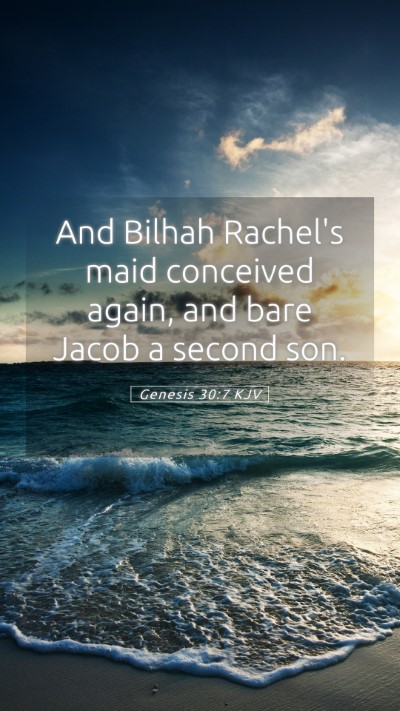Bible Verse Meaning: Genesis 30:7
Verse: "And Bilhah conceived, and bore Jacob a second son." (Genesis 30:7)
Overview and Context
This verse is situated in a broader narrative of Jacob's family dynamics, particularly the relationships he has with his wives, Leah and Rachel. The tension arising from Rachel's barrenness leads to the use of her maid, Bilhah, as a surrogate. This practice was culturally accepted in the ancient Near Eastern society, where lineage and offspring were highly valued.
Interpretation and Commentary
-
Matthew Henry:
Henry elaborates on the themes of rivalry and the struggle between Leah and Rachel for Jacob's affection. Bilhah’s role as a concubine reflects the desperation of Rachel to bear children and her attempt to compete with Leah. This verse illustrates human frailty and the complications entailed in polygamous relationships.
-
Albert Barnes:
Barnes highlights the fulfillment of Rachel's desires through Bilhah's childbirth. He emphasizes that despite Rachel's efforts to secure her place through the birth of children via Bilhah, the social and familial tensions remained unresolved. This underscores a possible allegory about divine sovereignty amid human action.
-
Adam Clarke:
Clarke provides cultural context on the significance of children in Hebrew tradition. He discusses how Bilhah’s children could be seen as legitimate heirs, thereby reinforcing Rachel's social standing. Children symbolize both love and conflict in this narrative.
Key Themes
-
Fertility and Childbearing:
The theme of fertility is central, as it reflects God’s blessings and the fulfillment of destiny. This verse illustrates how personal desires can lead one to alternative means to achieve fulfillment.
-
Human Relationships:
The complexities of human relationships are highlighted through the rivalries and jealousy that marked the interactions between Jacob's wives. This elucidates the broader human experience, including conflict and resolution.
-
Divine Sovereignty:
Despite the interpersonal strife, God's plan and purposes unfold, reminding readers that He can work through human actions, even flawed ones, to achieve His divine will.
Additional Insights
The context of Genesis 30:7 offers profound insights into the nature of God’s providence and how personal and familial struggles can illuminate broader theological truths. It encourages the reader to consider the reliability of God’s promises despite the tumult of human relationships.
Cross References
- Genesis 29:31 - Leah's perspective on being unloved and the blessings of children.
- Genesis 30:1-2 - Rachel's desperation leading to her proposal for Bilhah to bear children.
- Genesis 35:22 - The continuing family dynamics exploring the repercussions of these actions.
Conclusion
Genesis 30:7 serves as an important verse that opens a window into the complex lives of Jacob's family. By understanding the cultural, social, and theological implications, readers can derive meaningful lessons relevant to contemporary life.
Application to Daily Life
This verse, while steeped in the historical context of ancient Israel, invites us to reflect on our own struggles for recognition, love, and fulfillment. As we analyze such scriptures, we discover the timeless relevance of God's work in our lives, revealing insights pertinent for application in our personal and inter-personal relationships.


